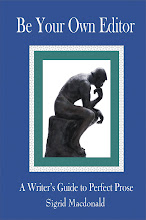Thoughts are part of our internal dialogue. "I think, therefore, I am," the great philosopher Descartes said. You can use the word think when you're talking about anything mental. Here's an example: "I think the snowstorm that just bombarded the north-eastern US may be on its way to Canada." You don't want to say, "I feel the snowstorm in the US may be on its way to Canada."
Using "I think" and "I feel" correctly is just a matter of paying attention. When you're aware that you have a tendency, as many of us do, to write "I feel" rather than "I think," you'll be more apt to be on the lookout for this construction.
Meanwhile, I hope that none of my readers were affected by that storm!
Sigrid Macdonald is a manuscript editor and the author of three books, including Be Your Own Editor, currently available on Amazon Kindle.


